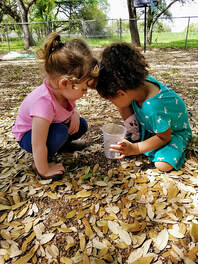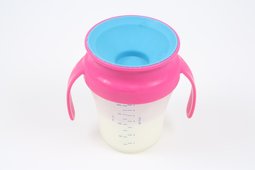
So, why is the loss of unstructured play so important?
|
Written by: Emily Swogger, OTR, MS  At Therapy Center of Buda we feel strongly about outdoor free play and providing our kiddos with a safe outdoor play space. Why are we so passionate about play? Because a child’s main occupation is to play. Play is how they learn new information in the most efficient manner. Yet in a world where children can spend up to 1200 per year on average in front of a screen, play time is rapidly being replaced with screen time. Time spent outside for children, research has shown, can be as little as 7 minutes per day! Time spent in play in general can be as low as 30 minutes per day. Play-based activities are being decreased for a variety of reasons. On the early education front, a societal emphasis on increasing test scores or meeting Common Core requirements has shifted the focus of early learning and preschool from social emotional skills to building math and reading skills. After-school the amount of play time is decreased due to lack of time to engage in play between longer work hours and the nightly routines of dinner, homework, and bath time. For some, lack of a safe place to play in neighborhood playgrounds and parks is also contributing factor to a decrease in outside play time. So, why is the loss of unstructured play so important?  Teaching our kiddos to use a zipper can be a difficult task. The truth is, it’s a very complex skill that encompasses many developmental areas! To zip a zipper up/down you must be able to motor plan, have bilateral coordination, display finger isolation, separate the two sides of the hand, have eye-hand coordination, have a strong pinch, and master the pincer and tripod grasps. Looking for zipper tools? Try a zipper board, a clothing fastener vest, or a fun cargo vest with zippers for creative play and zipper practice. Questions? Ask one of our awesome occupational therapists or contact us to schedule an evaluation! March is Trisomy awareness month, so it’s a perfect time to explain “what is trisomy?” Most people have 23 pairs of chromosomes, for a total of 46 chromosomes total. Trisomy is a genetic disorder in which an individual has an extra chromosome (partial or whole). Early identification is important in order to best evaluate, treat, and monitor for any possible developmental deficits or possible medical complications. Educating others of trisomy is important to not only provide a better understanding of the syndromes but to reinforce the notion that early intervention is vital for academic and social success.
Most common Trisomy disorders: Narrative language skills are vital to a person’s ability to not only have successful social relationships but also impact academic work (e.g., written language). Narrative skills are the ability to use language to tell a story. These skills begin to develop at the young age of 2 years! As a child’s narrative language skills develop they will begin to follow rules of storytelling (e.g., sequencing events, including characters, having an event/dialogue/solution, and an ending). Narratives may be fiction or non-fiction.
What should your child be doing? Check out this chart of narrative development.  Talking to our kiddos about their day at school is important. “Did you have a good day?” seems to be the automatic question we all ask, but it is important as parents to elicit more of a response. We want kiddos to learn to tell us about things, not just answer questions with one word (close ended questions). Let’s find some open ended questions that get our kids communicating with us! Read on for some sample questions.  It’s no secret to my families that I am not a fan of sippy cups. I get that they are a matter of convenience, but there are reasons why we should just skip over the sippy and head straight to open and straw cups. Let’s check out the pros and cons from a speech-language pathologist’s (and oral cavity) perspective.  While playing with playdoh can give optimal time to address receptive language, expressive language, pragmatic language, sensory, fine motor, gross motor, and handwriting development not all kiddos are able to safely play with it. Sometimes kiddos eat the playdoh or they are gluten sensitivity. Well, we have the solution! Follow the recipe below for some EDIBLE GLUTEN FREE PLAYDOH! Edible Gluten Free Playdoh Recipe Ingredients: -Baby rice cereal -Vegetable oil -Cornstarch(or gluten-free cornflour if you are in the UK or Australia) -Unsweetened Applesauce (you can substitute water if you don't have applesauce) -Food coloring (optional)  It's never too early to start tracking your baby's development. Although all children develop at different rates, there are development milestones widely accepted as a good benchmark for determining if your child is developing within generally accepted time frames. Our Clinic Director, Amy Grant, has taken the most credible and accepted lists and compiled our own checklists for parents to download for ages 6 months to 5 years old. If you are concerned about your child's development, early intervention is the key to getting them on track to developing their essential life skills for life. We offer free consultations - contact us today if you are concerned or uncertain if your child might benefit from Speech-Language or Occupational Therapy. We are here to help. Download Therapy Center of Buda's Developmental Checklists to track your child's progress at home. |
AuthorAmy Grant is a licensed Speech-Language Pathologist, Certified Autism Specialist and Clinic Director of Therapy Center of Buda. Family Corner Blog
Learn parenting tips, access credible resources on disabilities and find out how to bring therapy techniques home with you to make parenting a little bit easier. Legal Disclaimer Categories
All
SubscribeArchives
July 2024
|
Therapy Center of Buda |
WHAT OUR PARENTS SAY
|
